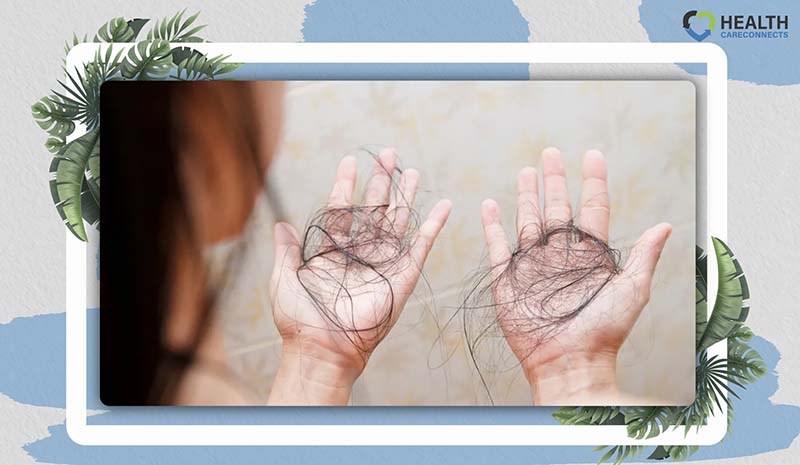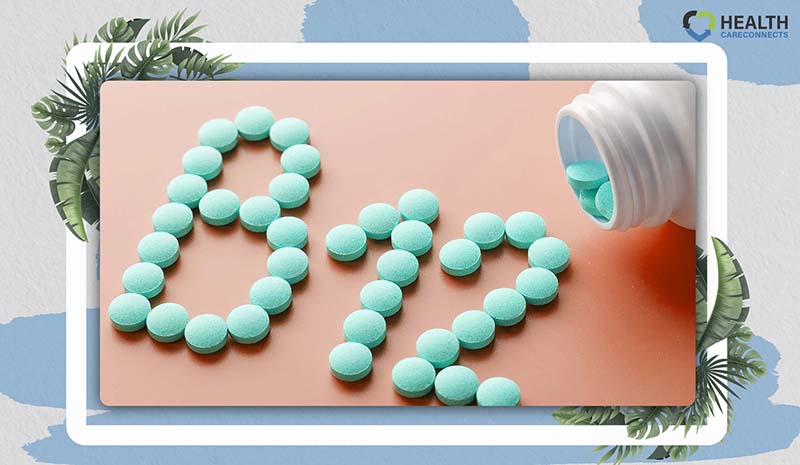Vitamin B12 is essential for overall health, and unlike many nutrients, your body cannot produce it independently; it must be sourced from your diet.
This article explores how Vitamin B12 influences hair health and examines whether hair loss linked to a deficiency might be reversible. Will hair grow back from B12 deficiency?
Explore the impact of this vitamin on your hair and find out the importance of maintaining adequate levels of B12.
Will Hair Grow Back from B12 Deficiency?
Having a clinical deficiency of Vitamin B12 can cause anemia, which is known to accelerate hair loss. While B12 supplementation can prevent further hair shedding, unfortunately, there is no guarantee that your hair will grow back once you correct the deficiency.
If you are experiencing hair loss and suspect nutritional deficiencies, such as from a restrictive diet, it’s best to get some blood tests to rule out anemia. Additionally, seeing a trichologist at the first signs of hair thinning and balding can help you get a timely diagnosis of the condition causing your hair to thin. This way, you can start treatment sooner and increase your chances of seeing hair regrowth.

Exploring the Link Between Hair Loss and Vitamin B12
When vitamin B12 levels are low, it can seriously impact hair growth and lead to excessive shedding. Here are some key ways B12 deficiency disrupts normal hair health:
- Slowed cell division: B12 helps produce DNA and enables cell replication needed for hair to grow from follicles. Without enough B12, cell proliferation slows, reducing hair production.
- Disrupted blood flow: B12 aids red blood cell formation, which carries oxygen and nutrients to the scalp and follicles. A deficiency can reduce blood supply to hair roots.
- Decreased hair follicle health: Vitamin B12 contributes to metabolizing nutrients that hair follicles need to stay healthy and productive. A lack of B12 can impair follicle function.
- Increased folate levels: B12 and folate balance each other in the body. Low B12 allows folate levels to rise, which has been linked to hair loss.
Research indicates that correcting a vitamin B12 deficiency can help treat hair loss and stimulate growth. However, the condition may become irreversible if prolonged deficiency causes permanent follicle damage.
Factors That Contribute to Vitamin B12 Deficiency
Vitamin B12 deficiency can occur due to various factors, including inadequate dietary intake, intrinsic factor deficiency, gastrointestinal conditions, autoimmune disorders, certain medications, and age-related decline.
- Inadequate Dietary Intake: A diet lacking in animal-based foods, which are the primary sources of vitamin B12, can lead to deficiency. Vegetarians, pregnant individuals, children, adolescents, and older adults are at a higher risk of developing a vitamin B12 deficiency due to inadequate dietary intake.
- Intrinsic Factor Deficiency: Intrinsic factor, a protein needed for B12 absorption, can become deficient due to pernicious anemia, leading to impaired B12 absorption.
- Gastrointestinal Conditions: Conditions like celiac disease, Crohn’s disease, and other gastrointestinal disorders can interfere with the absorption of B12 in the small intestine.
- Autoimmune Disorders: Autoimmune conditions, such as pernicious anemia or autoimmune gastritis, can result in the destruction of cells that produce intrinsic factor or damage the stomach lining, affecting B12 absorption.
- Medications: Certain medications, including proton pump inhibitors (PPIs) used to reduce stomach acid and metformin, a medication for diabetes, can interfere with B12 absorption.
- Age-Related Decline: As people age, the body’s ability to absorb B12 from food decreases, which can contribute to deficiency in older adults.
- Other Factors: Heavy alcohol consumption can lead to poor dietary intake, impaired B12 absorption, and damage to the stomach and small intestine, contributing to deficiency. Additionally, stomach conditions such as atrophic gastritis, infection with Helicobacter pylori bacteria, and a genetic condition that causes a lack of intrinsic factor can also cause vitamin B12 deficiency.

Effects of Vitamin B12 on Hair Health
Researchers believe that Vitamin B12 may play a role in hair follicle development and metabolism, alongside Vitamin B9 (folate). Since both are involved in red blood cell formation as well as the synthesis of DNA and proteins, a deficit in B12 or folate can slow down their production, impairing cell functions.
One in-vitro study suggests that B12 supplementation may stimulate follicles for quicker hair growth after a hair transplant, potentially leading to other applications for hair regeneration. However, more research is needed to understand and confirm if B12 can encourage hair growth.
While lower levels of B12 have not been proven to cause hair loss, deficiency has been associated with premature hair greying in relevant literature. A study conducted on 52 people under 20 years of age with premature greying revealed a B12 and folic acid deficiency in the test group, which was not reflected in the control group.
Tactics for Reversing Hair Loss Caused by B12 Deficiency
Treating a vitamin B12 deficiency requires a holistic approach to hair loss treatment, dietary changes, and lifestyle factors. Here are some key ways to overcome a shortfall:
- B12 Injections: These shots, delivered by a doctor, quickly elevate B12 levels in the body. They’re especially important for severe deficiencies.
- Oral Vitamin Supplements: Daily B12 pills can maintain adequate vitamin B12 levels for those with mild to moderate deficiencies or as a follow-up to injections.
- Eat Foods Rich in B12: Including animal products like beef, eggs, and dairy products can help restore levels through a healthy diet. Nutritional yeast and tempeh are good vegan sources of vitamin B12.
- Address Causes: Treating underlying medical conditions causing deficiency, like autoimmune disorders or celiac disease, is important.
- Reduce Stress: Chronic stress depletes B12 stores. Relaxation techniques like yoga and meditation can help manage anxiety.
- Check for Drug Interactions: Some prescriptions, like proton pump inhibitors, can impact B12 absorption and may need to be changed.
- Consider Over-the-Counter Products: Some shampoos, serums, and foams can aid the deficiency recovery process and support hair growth.
Replenishing B12 stores and maintaining adequate levels is crucial for healthy hair. Keep in mind that any medical treatment should be done under the supervision of a healthcare provider. Work with your doctor to create the right treatment plan for you. Hair regrowth can be a slow process, but each day brings you closer to restoring your locks.

Can Vitamin B12 Make Your Scalp Itch?
For some people with an allergy to cobalt, taking excessive amounts of vitamin B12 can lead to an itchy scalp, as cobalt is found in the center of vitamin B12.
Conversely, not having enough vitamin B12 can also lead to a dry scalp and dandruff, which often involves symptoms of itching.
If you do not have a cobalt allergy, taking sufficient doses of vitamin B12 can help your hair grow and possibly alleviate dandruff or dry scalp.
How Much Vitamin B12 Is Too Much?
The average daily requirement of vitamin B12 for a healthy adult is 2.4 micrograms. If you intake vitamin B12 naturally, the amount can be more than 2.4 mcg, as it is water-soluble. Your kidneys dissolve the excess amount of B12 and excrete it through urine.
The recommended amount increases to 2.6 mcg during pregnancy and 2.8 mcg during lactation.
Conclusion
While there are theories linking Vitamin B12 deficiency to hair loss, clinical studies have not definitively proven this relationship. Hair loss, or alopecia, is primarily influenced by genetics and aging, but it can also result from medical conditions, hormonal fluctuations, certain medications, and stress.
Many products on the market, including those with Vitamin B12, claim to combat hair loss. While Vitamin B12 plays a vital role in maintaining overall health, it is unlikely to have a significant impact on hair growth. Will hair grow back from B12 deficiency? For those looking to effectively manage hair loss and stimulate hair growth, proven treatments like minoxidil and finasteride are recommended.
For those seeking more information and honest product reviews, I recommend visiting HealthCareConnect.

Dr. Joyce Slater: Your Guide to Informed Health Choices
Dr. Joyce Slater shines as a distinguished expert in the field of nutrition and public health. Contributing her vast expertise to HealthConnectbc, she embodies a deep-seated passion for enhancing public well-being. As a respected figure in her field. Dr. Slater’s academic journey and professional achievements are nothing short of inspirational.
Holding a significant position as a researcher and educator, Dr. Slater has delved deeply into the intricacies of food literacy and nutritional science. Her work, prominently featured in numerous esteemed scientific publications, underscores her dedication to expanding our understanding of food’s role in health and society.
At the heart of Dr. Slater’s professional ethos is a profound desire to positively impact individual lives through education and research. She often says, “Empowering people with the knowledge to make healthier choices is the most rewarding aspect of my work.” This principle is the cornerstone of her involvement with HealthConnectbc, where she strives to provide reliable and practical health advice.
Dr. Slater’s contributions to HealthConnectbc are multifaceted: academically, she offers insights into the complex world of nutrition and health, enhancing both public understanding and professional practices. Additionally, she is instrumental in guiding and inspiring the next generation of health professionals, thus fostering future excellence in the field.
Juggling rigorous research with her educational duties, Dr. Slater demonstrates an unwavering commitment to her profession. Her approachable nature and genuine concern transcend the confines of academia, touching the lives of everyone she interacts with. Dr. Slater looks forward to continuing her journey of discovery and education, dedicated to the ongoing improvement of public health and nutrition.
At HealthConnectbc, Dr. J. Slater is not just a contributor; she is a guiding light, dedicated to enlightening and motivating individuals towards a healthier and more informed lifestyle.
PUBLISHED ARTICLES
- Food literacy competencies: A conceptual framework for youth transitioning to adulthood (2018)
- Self-perceived eating habits and food skills of Canadians (2016)
- Challenges to acquiring and utilizing food literacy: Perceptions of young Canadian adults (2016)
- Socio-demographic and geographic analysis of overweight and obesity in Canadian adults (2009)
- Sustainable well-being: Concepts, issues, and educational practices (2014)

